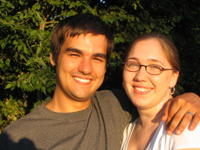Isaiah: Authorship and Unity
Except for one twelfth-century rogue rabbi, the authorship of Isaiah was never really questioned. With the rise of modern critical scholarship, though, it has become one of the most hotly debated books in the Old Testament. Most critical scholars hold that Isaiah son of Amoz and his disciples wrote the first 39 chapters, and some other prophet, known as "Deutero-Isaiah" wrote the second have of the book (ch. 40-66) after the Babylonian captivity. Some scholars would also divide ch. 56-66 into a third section written by a third prophet ("Trito-Isaiah") who lived after the return from captivity.
I have summarized the argument here for those who are interested in the debate. The important thing to remember, though, is that one can believe in multiple authors and still be a real Christian with a high respect for God's Word and one can believe in a single author and still be an educated and thinking person. So decide for yourself, but don't let it get in the way of hearing what the real Author has to say to us in the book itself.
Arguments for a single author:
- Tradition: Jewish tradition and early Christian writers considered Isaiah son of Amoz to have written the whole book. The New Testament always refers to it as a unity. The Dead Sea Scrolls have the whole book in one scroll without a significant break between ch. 39 and 40 (in fact, a few lines from ch 40 are at the bottom of a column). While this doesn't prove anything historically, it carries some weight in my book.
- Differences aren't conclusive: Isaiah was an accomplished writer who lived a long time. All writers change the way they write through the course of a lifetime, even from one setting to another (As a case in point, did you know that John "I-only-write-stupid-legal-thrillers" Grisham wrote the book from which the movie Christmas with the Kranks was made?). The theological differences are actually not as extreme as critics make them out to be, and certain words and phrases are used in both sections that are hardly used in any other prophetic books.
- Anonymity: Who in the world wrote the second have of Isaiah? He was one of the greatest writers in the whole Bible and we don't have any mention of him anywhere until the 18th century?
- Style and focus: Abrupt change in style and vocabulary at chapter 40 - becomes more lofty and poetic whereas ch. 1-39 are more concrete and illustrative. Theologically, ch. 1-39 tend to focus more on themes of God's judment, 40-66 contain more hopeful material, dealing with the restoration of Israel.
- Anonymity: Isaiah is not mentioned by name at all in ch. 40-66. (however, the same is true of 20-37)
- Predictive prophecy: references to specific people (Cyrus of Persia) and situations (the Babylonian exile) that Isaiah son of Amoz shouldn't have any knowledge of 150 years before they happened. Many, though not all, scholars who take this view don't account for the supernatural nature of the text.
- http://www.biblicalresources.info/pages/isaiah/unityofisaiah.html - a pretty thorough explanation of the argument for unity, without resorting to silly name-calling
- http://www.cresourcei.org/isaiahunity.html - a good, thoughtful discussion of the issue by a Bible-believing (though admittedly more theologically liberal) Christian who believes in multiple authors


0 Comments:
Post a Comment
<< Home